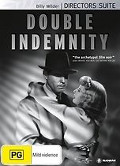
Directed by
Billy Wilder
103 minutes
Rated PG
Reviewed by
Bernard Hemingway

Double Indemnity
Billy Wilder’s tale of murderous infidelity was a controversial film in its day when Hollywood was still very much beholden to the Production Code (it took eight years to get a script that satisfied the censors). Whilst the film is now widely hailed as a pioneering and paradigmatic example of the film noir style it is a fairly rudimentary one
Released the same year in which the comfortingly wholesome Bing Crosby vehicle Going My Way stormed the Oscars, it was nominated for 7 Academy Awards and won none. Based on a short story by pulp fiction writer James M. Cain (also responsible for the thematically-related The Postman Always Rings Twice,1946) it tells of an insurance salesman, Walter Neff (Fred MacMurray) who falls for the charms of a gold-digger wife, Phyllis Dietrichson (Barbara Stanwyck) and arranges to have her husband die so that they can collect the money and... well, beyond that they haven't thought.
Wilder and Raymond Chandler wrote the script with the latter’s hard-boiled dialogue standing out (the initial encounter between Neff and Phyllis is particularly good. Strong performances from Stanwyck as a classic femme fatale and Edward G. Robinson as the tenacious claims investigator, Barton Keyes, who brings the scam undone add to the value.
MacMurray is at best serviceable. A Paramount contract player who was called in after both Alan Ladd and George Raft turned down the part, feeling that it was too nasty, MacMurray had previously made his name in romantic comedies and with his characteristic genial bemusement and little boy smile makes for an unlikely desperate lover, let alone cold-blooded murderer. An even bigger issue is Stanwyck. Whilst, like Bette Davis, she was a first-class actress she was no oil painting and it is difficult to accept that on the strength of one meeting and a bit of loaded repartee Walter would fall so hard.
If dramatically the treatment of the affair between Walter and Phyllis is mechanical, devices such as Keyes's "little man" and his constant need for a match are repeated too many times. Nevertheless, as an example of a classic Hollywood genre, Double Indemnity fits the bill well.
Want something different?





